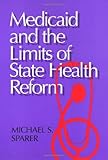Posted by admin on August 11, 2011 · Leave a Comment

With the defeat of national health reform, many liberals have looked to the states as the source of health policy innovation. At the same time, many in the new Republican majority and several governors also support increased state control. In contrast, Michael S. Sparer convincingly argues that states by themselves can neither satisfy the liberal hope for universal coverage nor the conservative hope for cost containment. He also points to two critical drawbacks to a state-dominated health care system: the variation in coverage among states and the intergovernmental tension that would inevitably accompany such a change. Supporting his arguments, Sparer analyzes the contradictions in operations and policies between the New York and California Medicaid programs. For instance, why does New York spend an average of ,286 on its Medicaid beneficiaries and California an average of ,801? The answer, the author suggests, is rooted in bureaucratic politics. California officials enjoy significant bureaucratic autonomy, while the system in New York is fragmented, decentralized, and interest-group dominated. The book supports this conclusion by exploring nursing home and home care policy, hospital care policy, and managed care policy in the two states. Sparer’s dissection of the consequences of state-based reform make a persuasive case for national health insurance. Author note: Michael S. Sparer is Assistant Professor of Health Policy in the School of Public Health at Columbia University.

List Price: $ 29.95
Price: $ 29.95
Filed under Medicaid Books · Tagged with argues, contrast, control, convincingly, defeat, governors, health, increased, innovation, limits, looked, majority, medicaid, michael, national, policy, reform, republican, several, source, sparer, state, support, themselves, time
Posted by admin on August 11, 2011 · Leave a Comment

- ISBN13: 9781451540734
- Condition: New
- Notes: BRAND NEW FROM PUBLISHER! 100% Satisfaction Guarantee. Tracking provided on most orders. Buy with Confidence! Millions of books sold!
This Minimum Data Set (MDS) 3.0 Coding Manual is an authoritative source of information about coding the MDS 3.0. The contents of this manual represent Chapter 3 of the Centers for Medicare and Medicaid Services’ (CMS) Long-Term Care Facility Resident Assessment Instrument (RAI) User’s Manual Version 3.0. Updated with CMS changes through 7/12/10. This manual includes item-by-item instructions for all required sections and items in the comprehensive MDS Version 3.0 item set with improved Table of Contents and pagination for faster reference. The goal is to facilitate the accurate coding of the MDS resident assessment and to provide assessors with the rationale and resources to optimize resident care and outcomes. Throughout this manual, MDS assessment sections are presented using a standard format for ease of review and instruction. Screenshots of each section are available for illustration purposes. The Appendix contains the entire MDS 3.0 as one document. To purchase bulk order copies of this manual, visit: www.ElderGuru.com/MDS

List Price: $ 49.95
Price: $ 39.16
Filed under Medicaid Books · Tagged with authoritative, books, brand, chapter, coding, completing, condition, confidence, contents, data, guarantee, information, isbn, item, manual, millions, minimum, notes, provided, publisher, represent, satisfaction, sold, source, tracking
Posted by admin on July 20, 2011 · Leave a Comment

Poor People’s Medicine is a detailed history of Medicaid since its beginning in 1965. Federally aided and state-operated, Medicaid is the single most important source of medical care for the poorest citizens of the United States. From acute hospitalization to long-term nursing-home care, the nation’s Medicaid programs pay virtually the entire cost of physician treatment, medical equipment, and prescription pharmaceuticals for the millions of Americans who fall within government-mandated eligibility guidelines. The product of four decades of contention over the role of government in the provision of health care, some of today’s Medicaid programs are equal to private health plans in offering coordinated, high-quality medical care, while others offer little more than bare-bones coverage to their impoverished beneficiaries.
Starting with a brief overview of the history of charity medical care, Jonathan Engel presents the debates surrounding Medicaid’s creation and the compromises struck to allow federal funding of the nascent programs. He traces the development of Medicaid through the decades, as various states attempted to both enlarge the programs and more finely tailor them to their intended targets. At the same time, he describes how these new programs affected existing institutions and initiatives such as public hospitals, community clinics, and private pro bono clinical efforts. Along the way, Engel recounts the many political battles waged over Medicaid, particularly in relation to larger discussions about comprehensive health care and social welfare reform. Poor People’s Medicine is an invaluable resource for understanding the evolution and present state of programs to deliver health care to America’s poor.

List Price: $ 24.95
Price: $ 18.39
Filed under Medicaid Books · Tagged with acute, aided, american, beginning, care, charity, citizens, detailed, federally, history, hospitalization, important, medicaid, medical, medicine, operated, people, people’s, poor, poorest, single, source, state, term, united



